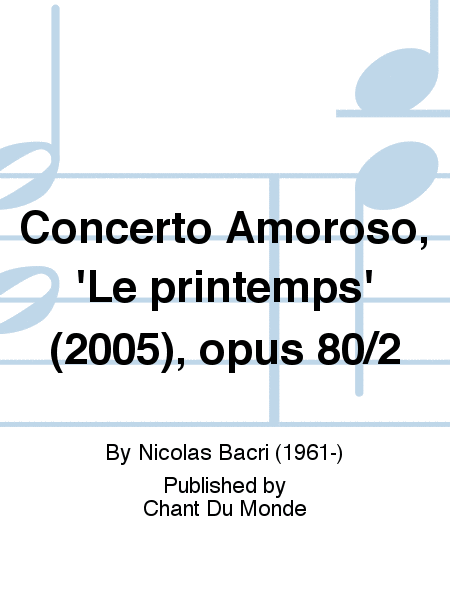Concerto Amoroso, 'Le printemps' (2005), opus 80/2
Solo for Oboe or Violin
Details
Description
SKU: BT.CDMMO4717
Solo for Oboe or Violin. Composed by Nicolas Bacri. Classical. Set (Score & Parts). Composed 2005. Chant Du Monde #CDMMO4717. Published by Chant Du Monde (BT.CDMMO4717).'The title only appears frivolous to those who have lived little. With the passage of time, the seasons that pass, the differences in quantity and quality of light, of temperature and weather, become of ever greater importance in the meaning of our individual existence. This transformation follows the path of our lives and often mimes in front of our very own eyes, incredulous and wondrous, events that we can only experience once in a lifetime: our birth, our blossoming, our aging and our death. Such a subject could well take up ten years of my life. This was the case. Nevertheless, everything started very innocently with a proposition from my friend Francois Leleux to write him a double concerto that he could play with Natalia Gutman, initially named 'Musica Concertante'. It was with this second proposition from Francois for another double concerto, this time with Lisa Batiashvili, that the idea came to me for a cycle of four concertos with, each time, a different instrument from the string quartet to join the oboe. The automnal colours of the cello are a perfect match for the retrospective nature of the first completed concerto in the cycle. 'concerto nostalgico, l'automne', whilst the love and the first child of the Leleux-Batiashvili couple could only bring Spring to mind, hence the 'Concerto amoroso, le printemps', was born. When Jean-Marc Bador asked me to be an associate of the Ensemble Orchestral de Paris for two years, it was quite naturally that I thought of completing this cycle for Francois Leleux, with winter 'Concerto tenebroso', created in January 2010 with Lise berthaud playing the viola. All that remained was for me to conclude, with a work that reunited all four protagonsits. It was summer, the 'Concerto luminoso', which took on this role'.

 Share
Share